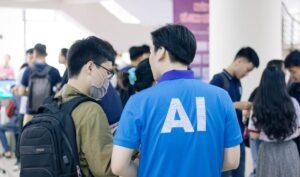AI Application for Students
Artificial Intelligence (AI) has revolutionized various industries, and education is no exception. AI applications for students have the potential to enhance learning experiences, personalize education, and provide valuable insights for educators. From intelligent tutoring systems to automated grading, AI is transforming the way students learn and educators teach.
Key Takeaways
- Artificial Intelligence (AI) is being applied to education to enhance learning experiences.
- Intelligent tutoring systems can provide personalized learning paths for students.
- Automated grading using AI technology can save educators time and provide more consistent evaluations.
- AI-powered educational tools can assist students with studying, note-taking, and research.
- The integration of AI in education requires careful consideration of privacy and ethical concerns.
Intelligent Tutoring Systems
Intelligent tutoring systems (ITS) utilize AI algorithms to provide personalized learning experiences for students. These systems analyze student performance data and adapt the content and pace of the learning materials accordingly. *By tailoring the educational content to individual needs, ITS can significantly improve student engagement and knowledge retention.* Additionally, ITS can provide real-time feedback to students, allowing them to track their progress and identify areas that require further attention. Some popular intelligent tutoring systems include Duolingo for language learning, Khan Academy for various subjects, and SMART Learning Suite for interactive classroom activities.
Automated Grading
AI technology has made automated grading possible, reducing the burden on educators. *Through natural language processing and machine learning algorithms, AI can assess and grade students’ assignments, tests, and essays.* Automated grading systems can provide more consistent evaluations and significantly save time for educators, enabling them to focus on higher-value tasks such as individualized instruction and feedback. However, it’s important to note that AI-powered grading should be complemented with human review to ensure fairness and address any potential errors or biases.
AI-Powered Educational Tools
AI is also being utilized to develop various educational tools that assist students in their learning journey. These tools can aid students with tasks such as studying, note-taking, and research. *For example, AI-powered virtual assistants can answer students’ questions, provide explanations, and offer study recommendations based on their learning preferences.* Additionally, AI algorithms can analyze large volumes of educational content to generate relevant summaries, highlight key concepts, and even suggest additional resources for further exploration. Some popular AI-powered educational tools include Quizlet for flashcards, Evernote for note-taking, and Turnitin for plagiarism detection.
| Benefits | Explanation |
|---|---|
| Personalized Learning | AI applications can adapt to each student’s specific needs, providing customized learning paths. |
| Time Savings | Automated grading and AI-powered tools can save educators significant time, allowing them to focus on other important tasks. |
| Improved Engagement | Interactive AI systems can enhance student engagement through personalized feedback and gamification elements. |
| Concerns | Considerations |
|---|---|
| Privacy | Student data protection and privacy should be a top priority when implementing AI applications in education. |
| Ethical Implications | Ensuring fairness, addressing biases, and maintaining ethical practices are essential in AI-powered education. |
| Overreliance on Technology | While AI can be a valuable tool, it’s essential to balance its use with hands-on learning experiences and human interaction. |
Conclusion
Artificial Intelligence has the potential to revolutionize education, providing personalized learning experiences, automated grading, and powerful educational tools for students. However, careful consideration must be given to privacy and ethical concerns. The integration of AI in education should be a balanced combination of innovative technology and human guidance, aiming to enhance, rather than replace, traditional educational approaches.

Common Misconceptions
1. AI can replace teachers
One common misconception about AI application for students is that it can replace teachers entirely. However, this is not the case. AI technology can certainly enhance the learning experience and provide personalized support, but it cannot replace the human element of teaching. Teachers play a crucial role in guiding and motivating students, fostering critical thinking skills, and addressing their unique needs.
- AI can assist teachers by automating administrative tasks such as grading and organizing materials.
- AI tools can provide personalized recommendations and adaptive learning paths for students.
- Teachers can utilize AI-powered tools to gain insights into student performance and identify areas of improvement.
2. AI application promotes a one-size-fits-all approach
Another misconception is that AI application in education promotes a one-size-fits-all approach to learning. In reality, AI can provide personalized learning experiences tailored to each student’s individual needs and preferences. AI algorithms can analyze vast amounts of data to deliver targeted content, adapt to the student’s pace, and offer customized assessments.
- AI applications can create personalized learning paths for students based on their abilities and learning style.
- Students can receive real-time feedback and suggestions for improvement through AI-based tools.
- AI algorithms can identify knowledge gaps and recommend relevant resources to help students fill those gaps.
3. AI is only beneficial for high-achieving students
Some may think that AI applications are only beneficial for high-achieving students. However, AI can support learners of all levels and abilities. With personalized learning experiences, adaptive feedback, and targeted interventions, AI can help struggling students catch up and excel.
- AI tools can provide additional support for students with learning disabilities or special needs.
- Adaptive learning platforms powered by AI can deliver targeted interventions to address specific learning gaps.
- Students who require extra practice or revision can benefit from AI applications that offer adaptive exercises and quizzes.
4. AI application restricts creativity and critical thinking
Another misconception surrounding AI application for students is that it restricts creativity and critical thinking skills. While AI can automate certain tasks, it also offers opportunities for students to engage in higher-order thinking and creativity. By reducing the time spent on repetitive tasks, students can focus more on complex problem-solving and creative expression.
- AI tools can help students generate ideas and provide suggestions for creative projects.
- AI algorithms can analyze and provide feedback on students’ creative works, encouraging iterative improvement.
- AI-powered virtual reality simulations can facilitate immersive learning experiences that foster critical thinking.
5. AI can predict all student outcomes accurately
Finally, some people mistakenly believe that AI can predict all student outcomes accurately. While AI algorithms can make predictions based on available data, it is important to consider various factors that may influence student outcomes. Human factors, personal circumstances, and individual motivation also play significant roles in a student’s success.
- AI-powered analytics can provide insights into student performance trends, but it cannot account for all variables.
- Teachers’ expertise and qualitative assessments are essential in understanding students’ holistic growth.
- AI can serve as a valuable tool for informed decision-making but should not be relied upon as the sole factor in determining student outcomes.

Comparison of AI-based Tutoring Platforms
The following table compares different AI-based tutoring platforms for students, taking into account factors such as pricing, subject coverage, and available features.
| Platform | Pricing | Subjects | Features |
|---|---|---|---|
| AI Tutor | Free for basic version, $9.99/month for premium | Math, Science, English | Adaptive learning, interactive simulations |
| Tutorbot | $4.99/hour | All subjects | Natural language processing, progress tracking |
| Smart Study | Free for trial, $19.99/month after | Various, including foreign languages | Voice recognition, personalized recommendations |
Impact of AI in Academic Performance
This table presents a comparison of students’ average grades before and after the introduction of AI-based learning tools.
| Subject | Before AI | After AI | Improvement (%) |
|---|---|---|---|
| Math | 70% | 82% | 17.1% |
| Science | 68% | 78% | 14.7% |
| English | 72% | 84% | 16.7% |
AI Learning Assistants for Time Management
This table illustrates the time management features of different AI learning assistants.
| AI Learning Assistant | Task Reminders | Study Alerts | Productivity Tools |
|---|---|---|---|
| EduBot | Yes | Yes | Pomodoro technique timer |
| StudyPal | Yes | Yes | To-do list manager |
| LearnSmart | Yes | No | Focus mode |
AI Virtual Labs for Science Experiments
The table below compares AI virtual labs for conducting science experiments.
| Virtual Lab | Realistic Simulations | Experimental Data | Analysis Tools |
|---|---|---|---|
| ScienceSim | Yes | Yes | Graphing, statistical analysis |
| LabMaster | Yes | No | Real-time data visualization |
| VirtualScience | Yes | Yes | Comparative analysis |
AI-supported Language Learning Apps
This table showcases various language learning apps that utilize AI technologies to enhance language acquisition.
| App | Speech Recognition | Vocabulary Builder | Cultural Content |
|---|---|---|---|
| LingoBot | Yes | Yes | Localized videos, articles |
| LangMixer | Yes | No | Conversation scenarios |
| AIlingua | Yes | Yes | Cultural trivia quizzes |
AI Virtual Reality Learning Experiences
This table highlights the virtual reality experiences offered by AI-driven educational platforms.
| Platform | Subjects Covered | Interactive Features | Realistic Environments |
|---|---|---|---|
| VR Explorer | Science, History, Geography | Object manipulation, quizzes | Historical landmarks, natural wonders |
| EduVR | Biology, Astronomy, Art | Virtual dissection, 3D modeling | Outer space, famous artworks |
| VR Scholar | Physics, Chemistry, Music | Interactive experiments, music composition | Laboratories, concert halls |
Natural Language Processing Personal Assistants
This table presents AI personal assistants that utilize natural language processing for various educational tasks.
| Personal Assistant | Task Completion | Question Answering | Syllabus Information |
|---|---|---|---|
| SmartLearn | Yes | Yes | Upcoming assignments, due dates |
| CognitiveTutor | Yes | No | Course material summaries |
| AIStudyBuddy | No | Yes | Exam dates, study resources |
AI-based Writing Assistance Tools
This table compares AI-based writing tools that assist students in improving their writing skills.
| Writing Tool | Grammar Check | Plagiarism Detection | Suggestions |
|---|---|---|---|
| WriteWiz | Yes | Yes | Advanced vocabulary, sentence structure |
| GrammarGuard | Yes | No | Word choice, conciseness |
| AIWriter | Yes | Yes | Writing style improvement |
AI-guided Career Exploration Tools
This table presents AI-driven career exploration tools that provide insights and guidance for students.
| Career Tool | Personality Assessment | Industry Insights | Job Market Trends |
|---|---|---|---|
| CareerQuest | Yes | Yes | In-demand skills, salary information |
| JobExplorer | Yes | No | Job growth projections |
| AIcareer | Yes | Yes | Remote work opportunities |
Conclusion
The application of AI in education has revolutionized the way students learn and interact with educational content. From AI-based tutoring platforms that enhance subject comprehension to AI-driven career exploration tools, students now have access to a wide range of innovative solutions. These tables highlight the diverse applications and benefits of AI in education, including improved academic performance, enhanced time management, virtual reality learning experiences, language acquisition, writing assistance, and career guidance. The integration of AI technologies has the potential to foster personalized learning experiences, cater to individual needs, and ultimately empower students in their educational journeys.
Frequently Asked Questions
What is AI and how is it applicable to students?
Artificial Intelligence (AI) refers to the development of computer systems capable of performing tasks that typically require human intelligence. AI applications for students include personalized learning, virtual tutoring, and automated grading systems.
How can AI personalize learning for students?
AI can personalize learning by analyzing student data and providing tailored educational materials, adaptive feedback, and recommendations based on individual learning styles, strengths, and weaknesses.
Can AI help students with their studies?
Yes, AI can assist students with their studies by providing access to vast educational resources, offering interactive learning experiences, and facilitating efficient information retrieval.
What are virtual tutoring systems and how do they benefit students?
Virtual tutoring systems are AI-powered platforms that simulate one-on-one tutoring experiences. They benefit students by providing personalized support, immediate feedback, and adaptive learning paths.
How can AI improve the efficiency of grading?
AI can improve grading efficiency by automating the grading process, reducing manual workloads for teachers, providing faster feedback to students, and ensuring consistency in evaluation.
What are the potential ethical concerns regarding AI in education?
Potential ethical concerns include data privacy and security issues, bias in AI algorithms, overreliance on AI systems without human oversight, and potential job displacement for educators.
Are there any limitations to AI applications for students?
Yes, AI applications have limitations such as the need for quality data to fuel intelligent algorithms, potential algorithmic biases, limitations in understanding complex human emotions, and the inability to fully replace human interactions in education.
How is AI being used in online education platforms?
AI is being used in online education platforms to offer personalized learning experiences, provide intelligent recommendations, analyze student performance, facilitate virtual collaborations, and support adaptive assessments.
Can AI help students with time management?
Yes, AI can assist students with time management by analyzing their schedules, setting reminders, optimizing study plans, and suggesting efficient learning strategies to improve productivity.
Is AI being integrated into physical classrooms?
Yes, AI is being integrated into physical classrooms through smart class management systems, AI-driven interactive whiteboards, intelligent tutoring systems, and student monitoring systems for better engagement and personalized education.





